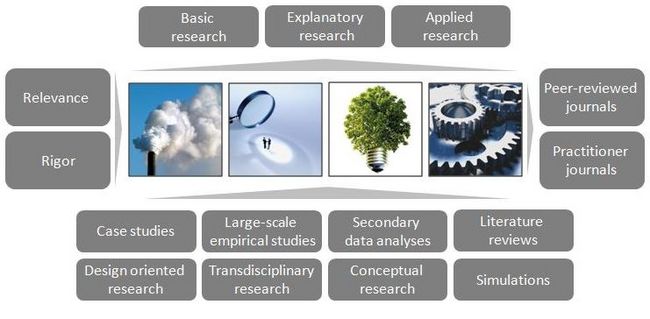Research
Contact
Head of the Chair
Secretary
Anschrift
Research
Motivation
Our current economy and way of life is not sustainable on a long term basis. Climate change, acidification and pollution of the seas, loss of biodiversity and chemical emissions reflect environmental problems which have reached global dimensions. Additionally, social problems such as intolerable working conditions and forced labor are still prevalent. In economical terms, the global financial crisis in 2008 was caused by systemic risks in the financial sector. These sustainability challenges are largely caused by firm operations. Unfortunately, firms have little self-interest to pursue socially desirable alternatives, because of negative externalities and the tragedy of the commons. The field of research of sustainability oriented supply chain and operations management addresses the question under which circumstances companies will pursue more sustainable solutions and what these solutions look like. It is generally characterized by a tension between the normative basic orientation of the sustainability ideal and empirical observable actions of companies on one hand and an interesting dynamic between the two levels of analysis, firm and system, on the other.
Research focuses
In our research at the chair, we apply four main perspectives for explaining or even anticipating solutions for more sustainable supply chain management, as shown in the following illustration.

- First, sustainability reflects an umbrella concept which subsumes various unique problems. Climate change, which is caused by the anthropogenic greenhouse effect, is currently commonly accepted to be the greatest of these problems. Hence the first research line focuses on the sub-problem of energy consumption and CO2 in operations management. In particular, we address problems of measurement and prevention in particular.
- Companies are especially likely to pursue more sustainable solutions in their supply chains, if non compliance is associated with economical risks. Thus the second research line focuses on a better understanding of those sustainability risks as a causal mechanism.
- Occasionally, more sustainable solutions are conceivable which do not yet exist. The third research stream refers to these sustainability innovations as instruments.
- The current role model in management research aims primarily at explaining the world as it is. Contrary to that the sustainability ideal requires development of new solutions. Therefore, our fourth stream of research questions the role model of management research. In this context, we address the gap between research and practice, as well as the further development of adequate research methods.
Research direction
We address problems which we regard as socially or economically relevant, as well as barriers, which obstruct the conduct of relevant research. We try to address these problems as rigorously as possible to gain new insights (conceptual relevance), enable innovative applications (instrumental relevance) or to open new research paths (basic research). The past spectrum of applied methods is very diverse (see the illustration), as we are always eager to choose the most appropriate method. Still, we tend to apply case studies, secondary data analyses, design oriented research, and conceptual research most often. We strive to publish our results primarily in international journals. To foster practical impact, we also publish transfer-oriented articles occasionally.
